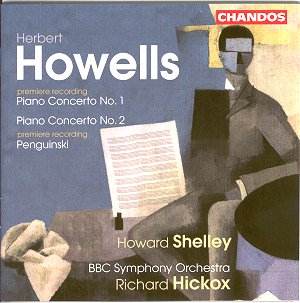HERBERT HOWELLS
Piano Concerto No.1 in C minor Op.4
Piano Concerto No.2 in C major Op.39
Penguinski
 Howard Shelley, piano
Howard Shelley, piano
BBC Symphony Orchestra/Richard Hickox
 CHANDOS CHAN
9874
CHANDOS CHAN
9874
Crotchet

Herbert Howells remains an important figure in British music, whose compositions
will continue to maintain their position in the repertory. This recording
of little known repertoire is therefore welcome in extending our awareness
of the nature of his art, as it is in raising the profile of the music itself.
Howells (1892-1983) lived a long life, surviving the Great War, unlike so
many of his friends and fellow musicians. Ironically he suffered a
life-threatening illness during the war years, from which he recovered to
live on past ninety. For many years, until well past the conventional retirement
age, he worked at the Royal College of Music, where Paul Spicer, the author
of the accompanying essay, was one of his students.
Howells began composing his opus 4, described here as Piano Concerto no.
1 at the age of 22, in the middle if his studies at the Royal College of
Music. Spicer's essay gives the background to the composition, which was
Howells's first large-scale orchestral work, and written for his fellow student
Arthur Benjamin. Since the Concerto was not published, there was no definitive
score, and in fact the last few bars were missing. They have been added for
this recording by John Rutter, who explains that his task was not so difficult
since Howells left such a detailed programme note.
But what of the music, and of the performance too? The latter is imposing,
and richly recorded by a top class orchestra. Howard Shelley gives fully
committed performances of both these concertos, whose music reveals how thorough
was Howells's awareness of contemporary trends: Debussy, Ravel and Rachmaninov
as well as Brahms, can be suggested as influences. The First Concerto, to
quote Spicer, is 'a prodigious achievement'.
The Second Concerto followed some ten years later, a Royal Philharmonic Society
commission in April 1925. It is a brilliant but complex work, and the scandal
of the premiere, at which the critic Robert Lorenz actually stood up and
shouted out 'Thank God that's over!' led Howells to decline its publication,
with enduring consequences, of course.
It is certainly a complex score, which has only been properly available to
the public since the present recording by Shelley and Hickox, and a few years
ago by Kathryn Stott and Vernon Handley (Hyperion). In both these performances,
supported by the wizardry of modern recording techniques, the music emerges
as a virtuoso tour-de-force.
Both the First Concerto and the short ballet item, Penguinski, receive their
premiere recordings here. The latter was composed in 1933, on the occasion
of the visit of the Prince of Wales to the Royal College of Music. The musical
style is uncomplicated, an affectionate tribute to Stravinsky and the Russian
Ballet, which had been successful in London for many years. Although barely
four minutes long, there is a big piano part, but above all the music is
notable for its vitality and wit.
Terry Barfoot

See also review by Hubert Culot

